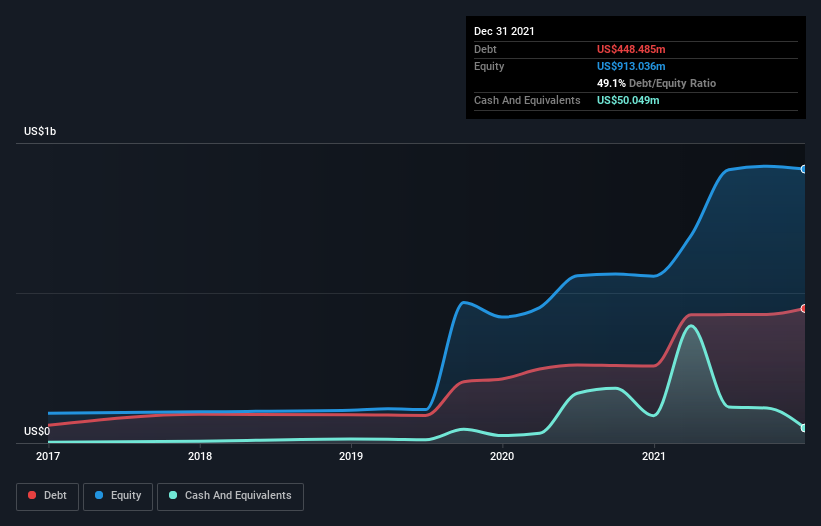- United States
- /
- Diversified Financial
- /
- NasdaqCM:RPAY
Repay Holdings (NASDAQ:RPAY) Is Making Moderate Use Of Debt

Warren Buffett famously said, 'Volatility is far from synonymous with risk.' So it might be obvious that you need to consider debt, when you think about how risky any given stock is, because too much debt can sink a company. We can see that Repay Holdings Corporation (NASDAQ:RPAY) does use debt in its business. But the real question is whether this debt is making the company risky.
When Is Debt Dangerous?
Generally speaking, debt only becomes a real problem when a company can't easily pay it off, either by raising capital or with its own cash flow. Ultimately, if the company can't fulfill its legal obligations to repay debt, shareholders could walk away with nothing. However, a more usual (but still expensive) situation is where a company must dilute shareholders at a cheap share price simply to get debt under control. Having said that, the most common situation is where a company manages its debt reasonably well - and to its own advantage. When we think about a company's use of debt, we first look at cash and debt together.
View our latest analysis for Repay Holdings
What Is Repay Holdings's Net Debt?
As you can see below, at the end of December 2021, Repay Holdings had US$448.5m of debt, up from US$256.7m a year ago. Click the image for more detail. However, because it has a cash reserve of US$50.0m, its net debt is less, at about US$398.4m.

How Strong Is Repay Holdings' Balance Sheet?
The latest balance sheet data shows that Repay Holdings had liabilities of US$92.3m due within a year, and liabilities of US$680.5m falling due after that. Offsetting this, it had US$50.0m in cash and US$33.2m in receivables that were due within 12 months. So its liabilities outweigh the sum of its cash and (near-term) receivables by US$689.5m.
While this might seem like a lot, it is not so bad since Repay Holdings has a market capitalization of US$1.37b, and so it could probably strengthen its balance sheet by raising capital if it needed to. But we definitely want to keep our eyes open to indications that its debt is bringing too much risk. The balance sheet is clearly the area to focus on when you are analysing debt. But ultimately the future profitability of the business will decide if Repay Holdings can strengthen its balance sheet over time. So if you want to see what the professionals think, you might find this free report on analyst profit forecasts to be interesting.
In the last year Repay Holdings wasn't profitable at an EBIT level, but managed to grow its revenue by 41%, to US$219m. Shareholders probably have their fingers crossed that it can grow its way to profits.
Caveat Emptor
Even though Repay Holdings managed to grow its top line quite deftly, the cold hard truth is that it is losing money on the EBIT line. To be specific the EBIT loss came in at US$37m. When we look at that and recall the liabilities on its balance sheet, relative to cash, it seems unwise to us for the company to have any debt. Quite frankly we think the balance sheet is far from match-fit, although it could be improved with time. We would feel better if it turned its trailing twelve month loss of US$50m into a profit. So we do think this stock is quite risky. There's no doubt that we learn most about debt from the balance sheet. But ultimately, every company can contain risks that exist outside of the balance sheet. These risks can be hard to spot. Every company has them, and we've spotted 3 warning signs for Repay Holdings you should know about.
If, after all that, you're more interested in a fast growing company with a rock-solid balance sheet, then check out our list of net cash growth stocks without delay.
New: AI Stock Screener & Alerts
Our new AI Stock Screener scans the market every day to uncover opportunities.
• Dividend Powerhouses (3%+ Yield)
• Undervalued Small Caps with Insider Buying
• High growth Tech and AI Companies
Or build your own from over 50 metrics.
Have feedback on this article? Concerned about the content? Get in touch with us directly. Alternatively, email editorial-team (at) simplywallst.com.
This article by Simply Wall St is general in nature. We provide commentary based on historical data and analyst forecasts only using an unbiased methodology and our articles are not intended to be financial advice. It does not constitute a recommendation to buy or sell any stock, and does not take account of your objectives, or your financial situation. We aim to bring you long-term focused analysis driven by fundamental data. Note that our analysis may not factor in the latest price-sensitive company announcements or qualitative material. Simply Wall St has no position in any stocks mentioned.
About NasdaqCM:RPAY
Repay Holdings
Repay Holdings Corporation, payments technology company, provides integrated payment processing solutions to industry-oriented markets in the United States.
Moderate growth potential with mediocre balance sheet.

